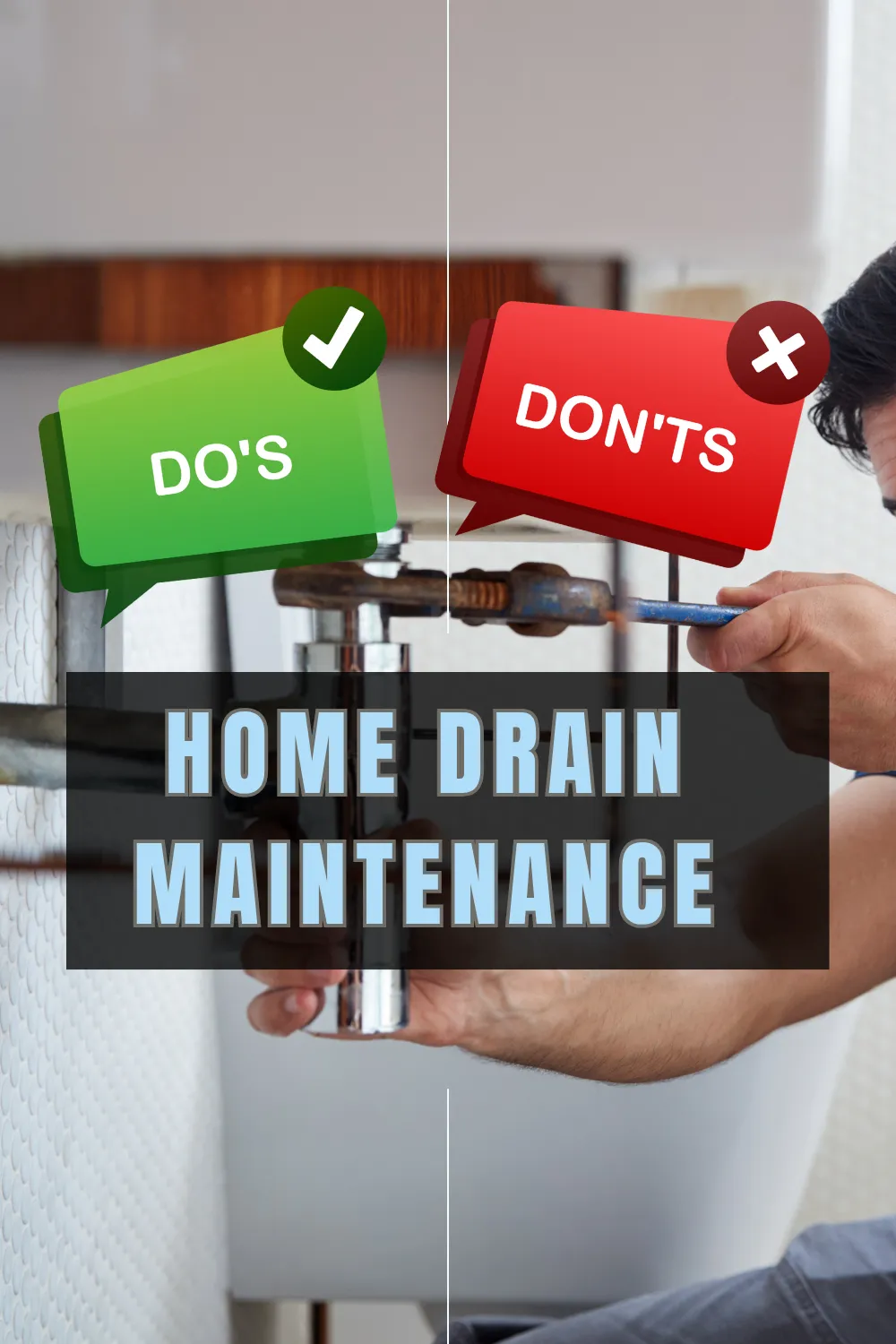
Must-Know Do’s and Don’ts of Home Drain Maintenance
" A healthy home starts with clear drains—know the do’s and don’ts, and your plumbing will thank you. " - Appliance Boss
Introduction: Why Proper Drain Maintenance Matters
Your home’s drain system is like the silent workhorse of your household. Out of sight, out of mind—until something goes wrong. When drains back up or emit foul odors, it’s not just an inconvenience; it’s a sign of neglect that can escalate into costly repairs. Taking the time to maintain your drains not only protects your plumbing but also helps maintain a clean, safe, and functional living space.
Understanding the Importance of a Healthy Drain System
A well-maintained drainage system ensures efficient water flow, prevents foul odors, and stops harmful bacteria from making their way back into your home. It also reduces the risk of water damage and pipe corrosion. Think of your drains as the veins of your home—when they’re clear and flowing, everything functions better.
Common Signs of Drain Trouble You Shouldn’t Ignore
Don’t dismiss a slow-draining sink or a gurgling toilet. These are early warnings of bigger issues lurking beneath the surface. Watch for pooling water, bubbling sounds, unpleasant odors, or water backing up. These signs often point to clogs, blockages, or even root intrusions. Addressing them early can save you from extensive damage and repair bills later.

The Do’s of Home Drain Maintenance
Do Use Drain Screens in Sinks and Showers
Drain screens act as the first line of defense against debris. These simple mesh barriers trap hair, food particles, and soap scum before they can enter your pipes. They’re inexpensive, easy to clean, and one of the most effective tools in your plumbing protection arsenal.
How Drain Screens Help Prevent Clogs Before They Start
By catching solid matter at the surface, drain screens prevent buildup deep inside your pipes where clogs become more difficult to remove. Over time, even small particles can form sludge that narrows your pipes like plaque in arteries. Screens help you stop problems before they form.
Do Clean Your Drains with Hot Water Regularly
Once a week, pour boiling water down your kitchen and bathroom drains. This flushes away grease, soap, and residue before they have a chance to solidify. It's a simple but powerful ritual that can keep your plumbing humming.
The Simple Weekly Habit That Keeps Pipes Flowing
Hot water helps dissolve fatty substances and dislodge minor debris. Think of it as a warm rinse that keeps the insides of your pipes free of sticky buildup. It's a habit as easy as brushing your teeth—and just as essential.
Do Use Natural Cleaners Like Baking Soda and Vinegar
Forget the harsh chemicals. A monthly mix of baking soda followed by vinegar creates a bubbling reaction that gently scours your pipes. It’s safe, eco-friendly, and surprisingly effective.
Gentle and Effective DIY Drain Cleaning Methods
Pour half a cup of baking soda down the drain, followed by one cup of vinegar. Let it fizz for 15 minutes, then rinse with boiling water. This natural reaction helps dissolve minor clogs and freshens your drains without damaging your pipes.
Do Be Mindful of What Goes Down the Kitchen Sink
Your garbage disposal isn’t a catch-all. Avoid putting pasta, rice, coffee grounds, eggshells, and fibrous vegetables like celery down the drain. These items expand, tangle, or create sludge that clogs pipes.
The Foods That Can Quickly Wreak Havoc on Your Pipes
Grease solidifies. Coffee grounds clump. Starches swell. Just because it fits in the drain doesn’t mean it belongs there. Scrape plates into the trash or compost bin instead.
Do Flush Bathroom Drains with Hot Soapy Water
Hair, toothpaste, and soap scum easily accumulate in bathroom sinks and tubs. Once a month, flush them with hot, soapy water to break down buildup and help keep pipes clear.
The Easy Monthly Rinse That Keeps Hair and Gunk Away
Use a kettle of hot water mixed with dish soap. It’s a gentle rinse that works wonders, especially when used consistently. It also helps reduce odors caused by organic residue.
Do Check Outdoor Drains and Gutters
Leaves, dirt, and roof debris can clog exterior drainage and affect your entire system. If water can’t flow freely away from your home, it may find its way into your basement or foundation.
Why Yard Debris Can Cause Indoor Plumbing Problems
Clogged gutters lead to poor drainage around your home. Water backs up, seeps into walls, and overwhelms sewer lines. A quick seasonal clean-up can prevent a plumbing disaster.
Do Educate Your Family About Drain-Friendly Habits
It only takes one person pouring grease down the sink or flushing wipes to cause a major clog. Make sure everyone in your household knows the rules.
How One Household Rule Can Prevent a Major Backup
Post a small sign near sinks or toilets if needed. Create awareness with kids and guests. It’s a team effort—small changes in behavior can prevent huge messes.
The Don’ts of Home Drain Maintenance
Don’t Pour Grease or Oil Down the Drain
It may look like liquid now, but grease hardens as it cools, forming solid blockages that cling to your pipes and trap other debris.
Why This Common Habit Is a Recipe for Blockages
Grease is the silent enemy of your plumbing. It acts like glue, attracting food particles and hair. Over time, it forms stubborn clogs known as “fatbergs.”
Don’t Use Harsh Chemical Drain Cleaners Often
While they may seem like a quick fix, chemical cleaners are corrosive. They eat away at your pipes and can cause long-term damage—especially in older plumbing.
The Hidden Damage These Products Can Do to Your Pipes
Frequent use wears down pipe walls, creating weak spots and leaks. These chemicals also pose a risk to septic systems and can be harmful to pets and children.
Don’t Flush Non-Flushables Down the Toilet
Just because it’s labeled “flushable” doesn’t mean it breaks down like toilet paper. Wipes, cotton pads, and feminine products can cause serious blockages.
How Wipes, Cotton Balls, and Paper Towels Clog Your Plumbing
These items expand in water and snag on pipe interiors. Over time, they create dense clogs that require professional equipment to remove.
Don’t Ignore Slow-Draining Sinks or Tubs
This isn’t just a nuisance—it’s a symptom of a forming blockage. Address it early with natural cleaners or a manual drain snake before it worsens.
Why Early Action Can Save You from Bigger Repairs
A slow drain could signal a clog deeper in your system. Catching it early can prevent backups, water damage, and the need for emergency plumbing.
Don’t Try to Snake the Drain Without Knowing How
Using a drain snake incorrectly can scratch porcelain, puncture pipes, or push clogs deeper into your system.
When DIY Fixes Can Make Things Worse
If you're unsure, it’s best to call a plumber. Improper techniques can result in costly repairs and even void warranties on newer plumbing systems.
Don’t Rely Solely on Store-Bought Drain Cleaners
These products may mask a larger issue. If you're frequently reaching for drain cleaner, there’s likely a more serious underlying problem.
Better, Safer Alternatives for Routine Maintenance
Use enzymatic cleaners designed to maintain biological balance in your pipes. They're non-corrosive and safe for both home and environment.
Don’t Let Hair Build Up in Shower Drains
Hair clogs are among the most common—and most avoidable—drain issues. Install a simple hair catcher and empty it daily.
Tips for Catching and Disposing of Hair the Right Way
Use tweezers or a flexible plastic tool to pull hair from the drain every couple of weeks. Don’t wait until water starts pooling.
Seasonal Drain Maintenance Tips
Preparing Your Drains for Fall Leaves and Winter Storms
As leaves fall and temperatures drop, inspect gutters and downspouts. Ensure all outdoor drains are clear and insulated if needed.
What You Should Do Before Cold Weather Hits
Disconnect garden hoses, insulate exposed pipes, and ensure sump pumps are working. Winter is no time for pipe bursts.
Spring Cleaning for Your Plumbing System
Spring is the perfect time to reset your system. Clear out debris, check for leaks, and flush all household drains.
How to Refresh Your Drains Alongside Your Home
A thorough clean can help reset water flow and remove any buildup that formed during colder months. Pair this with a water heater flush for optimal results.
When to Call a Professional Plumber
Warning Signs It’s Time to Bring in the Experts
Repeated clogs, water backing up, strange smells, or gurgling pipes are all red flags. If DIY methods fail, don’t delay—get professional help.
What to Expect During a Professional Drain Inspection
Plumbers use camera inspections to see inside your pipes. They can locate blockages, cracks, or tree root intrusions with precision and recommend the best solution.
Conclusion
Creating a long-term plan for drain health doesn’t have to be complicated. It’s about consistency, awareness, and taking action before minor issues become major ones. By following simple routines—like using drain screens, flushing with hot water, and keeping non-flushables out of your pipes—you’ll protect your plumbing system and extend its lifespan.
When you build good drain habits into your weekly and seasonal routines, you’re investing in a cleaner, more efficient home. And if you ever notice warning signs that seem beyond your control, it’s important to know when to hand it over to the pros.
At Zip Does Plumbing, we’re here to help you stay ahead of drain problems with expert inspections, professional cleanouts, and honest, reliable service. Whether you need routine maintenance or emergency plumbing support, you can count on us to get the job done right.
Visit www.zipdoesplumbing.com or call us at (661) 370-2701 to schedule your service today. Let’s keep your home flowing smoothly—one drain at a time.
